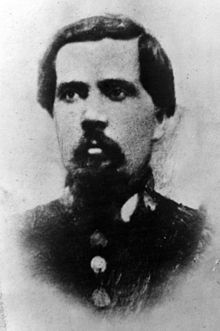James Dearing
| James Dearing | |
|---|---|
 |
|
| Born |
April 25, 1840 Campbell County, Virginia |
| Died | April 22, 1865 (aged 24) Lynchburg, Virginia |
| Place of burial | Spring Hill Cemetery, Lynchburg |
| Allegiance |
|
| Service/branch |
|
| Years of service | 1861–65 |
| Rank |
(not confirmed) |
| Commands held | Dearing's (Lynchburg) Battery 38th Virginia Light Artillery Battalion 8th Confederate Cavalry Regiment Dearings Brigade |
| Battles/wars | |
James Dearing (April 25, 1840 – April 22, 1865) was a Confederate States Army officer during the American Civil War who served in the artillery and cavalry. Dearing entered West Point in 1858 and resigned on April 22,1861 when Virginia seceded from the Union. Dearing was mortally wounded at the Battle of High Bridge during the Appomattox Campaign of 1865, making him one of the last officers to die in the war. Despite serving as a commander of a cavalry brigade and using the grade of brigadier general after he was nominated to that grade by Confederate President Jefferson Davis, Dearing did not officially achieve the grade of brigadier general because the Confederate Senate did not approve his nomination. His actual permanent grade was colonel.
Dearing was born in Campbell County, Virginia. He was a great-grandson of Colonel Charles Lynch, a famous revolutionary war veteran who probably gave his name to what is now known as "lynching". A graduate of Hanover Academy he received an appointment to the United States Military Academy in 1858, where he was described as “a reckless, handsome boy” who introduced the tune “Dixie” to the academy, earning him the reputation of a secessionist and demerits from his superiors. Nonetheless he was ranked first in his class of 1861. When his home state seceded he resigned, just short of his graduation, on April 22, 1861.
Dearing traveled to Richmond, Virginia, getting a commission as lieutenant of artillery in the Virginia Militia. He joined the recently arrived Washington Artillery from New Orleans, Louisiana; and was commissioned as 2nd Lieutenant and drill instructor in the 3rd company. He participated in the First Battle of Bull Run while being assigned to the 1st company as part of the 4th Brigade of Colonel Jubal Early in the Army of the Potomac, and served as volunteer aide to his battalion commander Major James B. Walton. Dearing was promoted to 1st Lieutenant in July 1861; and to Captain in April 1862 when he became commander of the reorganized Lynchburg ("Latham´s") Battery. Dearing's (Virginia) Battery was attached to George E. Pickett's Brigade and supported it in the Peninsular Campaign, where Dearing was highly praised by Lieutenant General James Longstreet, and in the Second Battle of Bull Run. When Pickett was elevated to division command in Longstreet's First Corps in September Dearing's battery was assigned to the division and fought in the Battle of Fredericksburg.
...
Wikipedia
